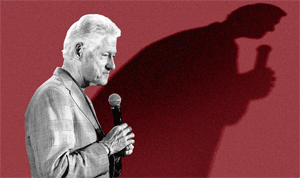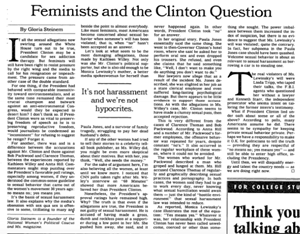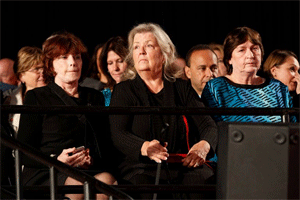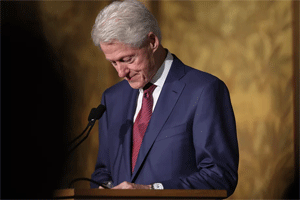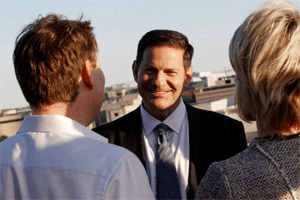Transcript of Interview With Kathleen Willey [Ed Bradley, CBS 60 Minutes]National Politics
The New York Times
March 16, 1998
NOTICE: THIS WORK MAY BE PROTECTED BY COPYRIGHTYOU ARE REQUIRED TO READ
THE COPYRIGHT NOTICE AT THIS LINK BEFORE YOU READ THE FOLLOWING WORK, THAT IS AVAILABLE SOLELY FOR PRIVATE STUDY, SCHOLARSHIP OR RESEARCH PURSUANT TO 17 U.S.C. SECTION 107 AND 108. IN THE EVENT THAT THE LIBRARY DETERMINES THAT UNLAWFUL COPYING OF THIS WORK HAS OCCURRED, THE LIBRARY HAS THE RIGHT TO BLOCK THE I.P. ADDRESS AT WHICH THE UNLAWFUL COPYING APPEARED TO HAVE OCCURRED. THANK YOU FOR RESPECTING THE RIGHTS OF COPYRIGHT OWNERS.
Following is an interview conducted with Kathleen Willey by correspondent Ed Bradley on the CBS News program "60 Minutes" and broadcast on March 15, as transcribed by the Federal Documents Clearing House:
BRADLEY: The significance of Kathleen Willey's account of her incident with President Clinton is that -- if true -- it is more than just a case of inappropriate behavior.
It leaves the president wide open to charges of perjury -- an impeachable offense -- that he lied repeatedly when he testified under oath in the Paul Jones case about his encounter with Kathleen Willey.
In addition, her story could also shed light on another issue being looked at by the special prosecutor: Did the White House seek to obstruct justice -- which is also a crime -- by pressuring Willey and others to alter her story?
Kathleen Willey is 51-years-old and lives in Richmond, Virginia. A loyal democrat, she campaigned hard for Bill Clinton in 1992.
Along with her late husband Ed, she volunteered her time and contributed thousands of dollars to Mr. Clinton's bid for the White House.
(BEGIN VIDEOTAPE)
In your mind back then, what stood out for you about Bill Clinton?
WILLEY: His sincerity.
I -- liked the fact that -- he was my age -- our age. I -- liked the things that he believed in. He was a contemporary of mine.
BRADLEY: How -- would you characterize at that time, your relationship with the president?
WILLEY: We were friends.
We had had the occasion to speak with him on election night. He had called us right after the election -- called me, just to thank us for our help. I would say good friends.
BRADLEY: Once Bill Clinton became president, Kathleen Willey continued her volunteer work at the White House, in the correspondence office, where she helped respond to the huge volume of mail coming in for the new president.
In this job, did you have much interaction with the president?
WILLEY: At that time? No.
BRADLEY: She says all that changed right after she saw the president, one day, on the White House lawn, and then got a call from the president's scheduler, Nancy Hernreich.
WILLEY: I saw the president at the White House Easter Egg roll, where I was helping out, and he asked where I was.
And, when I got home that afternoon, there was a phone call from -- from Nancy Hernreich, asking me if I would come up and meet with her, that the president had an interest in my working someplace else other than correspondence.
BRADLEY: Kathleen Willey was given a job in the White House social office, located in the East wing, near the Oval office.
Did you see the president more often in this job than you did in the -- the other one?
WILLEY: Yes.
I was in the East Wing at that point, yes.
(END VIDEOTAPE)
BRADLEY: But Kathleen Willey's life was about to fall apart. Her husband, a lawyer, was in deep trouble.
He was under investigation for embezzling money from his clients, and the Willey family's finances were in a shambles. Kathleen Willey told her husband she needed to do something about it, and that she was going to see her "good friend," President Clinton.
(BEGIN VIDEOTAPE)
WILLEY: And I told him that I was going to go to Washington and ask the president for a full-time paying job.
BRADLEY: And -- and you felt comfortable doing that?
WILLEY: Yeah.
Absolutely.
BRADLEY: What you are about to hear is what Kathleen Willey says happened behind closed doors that day, between her and the President of the United States, inside the Oval office.
So, let me ask you to take me through it, step by step, what happened when you went into the Oval office?
WILLEY: I went in, and the president was at his desk, and I sat down in the chair across from him, and I obviously looked very distraught.
He asked me what was wrong. I told him I had a really serious problem and that I needed his help. And, he said, "Would you like a cup of coffee?" And I said, "Yes, I would."
So he -- he walked to another -- a door on the other side of the Oval office, which led into a hallway, into his small galley kitchen, and there was a -- a steward in there, I remember.
And the president took a -- a coffee cup down out of the pantry, and -- a Starbucks coffee cup, I remember -- and, he poured me a cup of coffee, poured himself a cup of coffee, and we started walking back down the hall towards the Oval office and he said, "why don't you come in here into my study? We can talk better in here."
And, I stood and leaned -- I was leaning against the door jam. He was in the office.
We were standing facing each other, and I told him what had happened. I -- I didn't give him all the details. I just told him that my husband was in financial difficulty, and that things were at a crisis point, and that my volunteer -- volunteer days were over, that -- that I needed a -- a regular paying job, and could he help me?
BRADLEY: And, did he seem sympathetic? Did he say...
WILLEY: Yes.
BRADLEY: ... he could help you?
WILLEY: Yeah, well, he did seem sympathetic.
He -- he -- he was listening. I -- I had the feeling that he was somehow distracted when I was talking to him, but -- but he was not really -- really listening, but I know that he did. I know he knows how distraught I was and how upset I was, because I -- I was -- I was very worried. I was worried about my husband, and -- and -- and what as going to happen.
BRADLEY: And what happened next?
WILLEY: Well, he -- he said he would do everything that he could to -- to -- to help, and I turned around and -- out of the -- out of the office, and he followed me to -- I thought he was going to open the door to the -- to the Oval office, and right as we got to the door, he stopped and he gave me a big hug and said that he was very sorry that this was happening to me.
And -- I had -- had no problem with that, because when I saw -- every time I saw him, he would hug me.
He use -- just does that, is like that.
And, I remember I had -- still had this coffee cup in my hand, and it was kind of in between us, and I didn't want it to spill on him or me, and -- and it just was this -- it was just very strange. And he -- he took the coffee cup out of my hand and he put it on a bookshelf, and -- and -- he -- this hug lasted a little longer than I thought necessary, but at the same time -- I mean, I was not concerned about it. And then he -- then he -- and then he kissed me on -- on my mouth, and -- and pulled me closer to him. And -- I remember thinking -- I just remember thinking, "what in the world is he doing?" I -- it -- I just thought, "what is he doing?" And, I -- I pushed back away from him, and -- he -- he -- he -- he -- he's a big man.
And he -- he had his arms -- they were tight around me, and he -- he -- he touched me.
BRADLEY: Touched you how?
WILLEY: Well, he -- he -- he touched my breasts with his hand, and, I -- I -- I -- I was -- I -- I was just startled.
I was -- I was just...
BRADLEY: This -- this wasn't an accidental grazing touch?
WILLEY: No.
And -- then he -- whispered -- he -- he -- said in -- in my ears that, "I -- I've wanted to do this ever since I laid eyes on you." And -- I remember -- I remember saying to him, "aren't you afraid that somebody's going to walk in here?" The -- and, he said -- he said, "no. No, I'm -- no, I'm not." And -- and then -- and -- and then he took my hand, and he -- and he put it on him. And, that's when I pushed away from him and -- and decided it was time to get out of there.
BRADLEY: When you say he took your hand...
WILLEY: Right.
BRADLEY: ... and put it on him...
WILLEY: Hum-hum.
BRADLEY: Where on him?
WILLEY: On -- on his genitals.
BRADLEY: Was he a -- aroused?
WILLEY: Yes.
BRADLEY: He was.
WILLEY: Yes.
BRADLEY: What were you thinking?
WILLEY: Well, I -- I was -- there was -- I -- there were all kinds of things going through my mind.
I -- I think as -- when I think back on it, it was kind of like I was watching it in slow motion, and -- and thinking surely this is not happening. And, at the same time, I -- I wanted to -- I thought, "well, maybe I ought to just give him a good slap across the face." And then I thought, "well, I don't think you can slap the President of the United States like that." And -- and I just decided it was just time to get out of there.
BRADLEY: Did you say anything to him, or was there anything about your behavior that invited an advance?
WILLEY: I -- I -- I have gone over this so many times, so very many times, because I think that your natural instinct is to wonder, "Did I bring this on? Did I send a -- a -- the wrong signal?" The only signals that I was sending that day, was that I was very upset, very distraught, and I needed to help my husband.
BRADLEY: Did you feel intimidated?
WILLEY: I didn't feel intimidated.
I just felt overpowered.
BRADLEY: Did you ever say, "stop.
No. Get away from me?"
WILLEY: I just -- I -- I pushed him away.
I pushed him away, and -- and I said, "I think I -- I'd better go."
BRADLEY: And what did he say?
WILLEY: He -- he -- he kept looking at his watch, 'cause he told me that he had a meeting, and he said -- he said -- that he could -- he said they could wait.
And I said, "Well..." I said, "well, I'm leaving."
BRADLEY: When you walked out of there, what -- what were you thinking?
WILLEY: I just could not believe that that had happened in that office.
I -- I just could not believe -- the recklessness of that act.
BRADLEY: Recklessness? What do you mean "recklessness"?
(END VIDEOTAPE)
BRADLEY: The FBI is now investigating charges that this man -- Nathan Landow, a major Democratic Party contributor with close ties to the White House, tried to pressure Kathleen Willey to keep her story secret.
60 Minutes has learned that this past week, the grand jury heard testimony from a key witness who said Landow had done just that. But his story is that he hardly knew her.
(BEGIN VIDEOTAPE)
Nate Landow -- you -- you know him?
WILLEY: Yes.
BRADLEY: Would it be fair to say that this is someone you'd seen more than a couple of times? This wasn't just a casual acquaintance?
WILLEY: Yes.
BRADLEY: You had discussed, with Nate Landow, the incident that took place in the White -- in the White House...
WILLEY: Yes.
BRADLEY: ...in the Oval office?
WILLEY: Extensively, yes.
BRADLEY: It's been reported that he has brought pressure on you, not to talk about it publicly.
Is that true?
WILLEY: I can't say at this point, because it's a -- all that's going on.
BRADLEY: All of these ongoing investigations.
WILLEY: Investigations, yes.
BRADLEY: Willey's lawyer advised her not to say any more about Landow; that's probably because Willey is cooperating with Kenneth Starr, who may not want to reveal his hand before Landow is called to testify before the grand jury.
Landow declined our request for an interview and, as we said, he says they hardly knew each other, and that he'd never had a detailed conversation with her about any of her relationships.
While Kathleen Willey did not want to talk about Nathan Landow, she did tell us other people close to the president have tried to influence her.
Have you ever been pressured?
WILLEY: Yes.
BRADLEY: How? Tell me about it.
WILLEY: I felt pressured by Mr. Bennett.
BRADLEY: The president's attorney?
WILLEY: Yes.
We -- we were together at some point before our court hearing, and he mentioned that he had just left -- he had just been at the White House, and -- and the -- the president asked for me and told him just -- that he just thought the world of me. And, he said, "now, this -- this was not sexual harassment, was it?" And, I didn't answer him.
And he said, "well -- and it wasn't -- not -- it wasn't -- it -- it wasn't unwelcome, was it?" And I said to him, "it was unwelcome and unexpected."
BRADLEY: Did you feel intimidated by Bennett?
WILLEY: I -- I felt pressured.
Especially when he threw in the -- the business about, "well, the president just feel -- thinks the world of you," and it -- it -- I found that a little laughable, though.
BRADLEY: Why?
WILLEY: Well, because if the president thought the world of me, why did he do what he did?
BRADLEY: Willey says she did not find it laughable when, she says, Bennett suggested she find herself a criminal lawyer.
WILLEY: It -- the insinuation to me was that Mr. Bennett was implying that I was going to face some kind of a criminal charge for perjury or -- or something else, and that I would need an inside dilute -- an inside Washington criminal lawyer, and -- and I -- I didn't, and I don't.
BRADLEY: Bob Bennett says that isn't so and insists that, if Willey says that, she is lying.
For her part, Willey says if there are any perjury charges to be filed, they should be directed at the president.
He said under oath, that the meeting stands out in his mind because you were so distraught, you were so...
WILLEY: Right.
BRADLEY: ... emotional that day, and that he may have kissed you on the forehead in a consoling way...
WILLEY: Right, right.
BRADLEY: ... but it was not a sexual advance.
If the president said that under oath, is he lying.
WILLEY: Yes.
BRADLEY: He is lying?
WILLEY: Yes.
(END VIDEOTAPE)
BRADLEY: When the story first emerged last summer, the president's lawyer, Bob Bennett, said that Clinton had no specific recollection of ever meeting Willey in the Oval office. The president's lawyer also said then, that it was preposterous to suggest that Clinton made a sexual advance toward Willey.
But in a sworn deposition two months ago, the president contradicted his own lawyer, saying he remembered, "very well," an Oval office meeting with Kathleen Willey.
Still, Clinton denied emphatically any sexual encounter.
(BEGIN VIDEOTAPE)
What do you make of the conflict? I mean, there's a clear contradiction there.
WILLEY: I know.
BRADLEY: What do you make of that?
WILLEY: I -- I think that he probably realized that, completely disavowing any meeting was -- was just ludicrous.
When I came out of the Oval office, the first person I saw was -- was Lloyd Benson, and it has since been reported that, yes, indeed, he was there for a 3:00 meeting. I mean, these things can be documented.
(END VIDEOTAPE)
BRADLEY: Kathleen Willey says looking back on it now, the incident that day in 1993, was not the first time the President had shown an unusual interest in her.
She remembers a day in 1992, when then Governor Clinton made a campaign trip to Richmond, Virginia, where Willey was volunteering to help get him elected.
(BEGIN VIDEOTAPE)
WILLEY: I was at the airport to welcome him.
And, while I was out there meeting him, he -- he spotted me, and -- and we waved because we had -- I had seen him before at previous fund-raisers, and he sent someone over to get my telephone number.
BRADLEY: Did he ever use it?
WILLEY: He called me when -- when he got to Williamsburg, and when I got home he called me, and he asked me if -- if I could -- he -- he had lost his voice, and he was worried about that for the -- for the next -- for the -- the debate the next evening.
And he asked me how far I was from Williamsburg, and I told him. And I, kiddingly, told him -- I just jokingly said, "it sounds like you need some chicken soup." And, he said, "well, would you bring me some?" And I said -- I -- I don't really think I answered him because I thought he was just... being facetious.
And then he told me that he was surrounded by Secret Service agents, and that he would -- he would try to get rid of them, and -- if I would come down. And he said he would call me back later, which he did. And I declined to go.
BRADLEY: You declined to go because...
WILLEY: Because my instincts told me he wasn't interested in chicken soup.
(END VIDEOTAPE)
BRADLEY: In an effort to raise questions about Kathleen Willey's credibility, the president's lawyers obtained a sworn affidavit from a woman who used to be one of Willey's closest friends.
Her name is Julie Steele. And she initially confirmed Kathleen Willey's story, saying that Willey went to Julie Steele's house on the night of the incident, with president Clinton; and then Willey told her what had happened. But in that affidavit, Steele now maintains that she lied at Willey's request.
(BEGIN VIDEOTAPE)
Why would she say that?
WILLEY: My own personal belief is that she was pressured.
I think that in -- I think that the White House wanted to try to discredit me, and they found a pawn in her.
(END VIDEOTAPE)
BRADLEY: The affidavit Steele signed at the request of the White House lawyers said Steele had, quote, "never heard any allegations of improper conduct by President Clinton" until Willey asked her to lie, but Steele told Newsweek magazine that Willey had told her of an incident between Willey and the president.
And there's yet another woman in this story -- Linda Tripp; that's the same Linda Tripp, who secretly tape-recorded Monica Lewinsky, talking about an affair Lewinsky claimed she had with President Clinton.
What does Linda Tripp have to do with Kathleen Willey?
They worked together at the White House, and Tripp was there when Willey emerged from the president's office that day, in 1993.
(BEGIN VIDEOTAPE)
Did you say anything to her?
WILLEY: I remember saying to her -- I -- saying, "you are just not going to believe this." And we went outside, and I told her what had happened.
BRADLEY: You say that you were angry, you were upset, you were distraught.
Yet, she says you were joyful.
WILLEY: I -- I think probably -- in defense of her -- I think -- when I am in -- if I get into a very tense -- tense situation, I try to -- I fall back on my sense of humor.
I think when I said, "you are not going to believe this one," maybe she took that as joyful.
(END VIDEOTAPE)
BRADLEY: A few months later, Kathleen Willey, shown here in a White House photograph with the president, had received a part-time paying job, and Linda Tripp was moved from the White House to the Pentagon.
According to Willey, Linda Tripp was furious.
(BEGIN VIDEOTAPE)
WILLEY: She said, "Don't you think for one minute that I don't know what's going on around here." And I said, "I don't know what you mean." And -- and she said, "I know you're here because the president wants you here.
And -- and they want me out of here because I -- because I know what happened." And I said, "that's just absolutely, positively, not true."
She was very angry.
Very upset. Very bitter. And she -- she ended the conversation by saying, "I'm going to get you, and every place -- everyone else in this place, before this is all over."
(END VIDEOTAPE)
BRADLEY: Linda Tripp, through her lawyer, denies saying she was out to get anyone.
But somehow Willey's name came to the attention of Paula Jones's lawyers, and Willey -- who says she intended to take her story to the grave -- was ordered by a judge to give her deposition.
(BEGIN VIDEOTAPE)
You -- you were a reluctant witness.
You didn't want your story to go public?
WILLEY: No.
BRADLEY: Why not?
WILLEY: I just knew that -- it was just a bad story.
It was just horrible behavior on the part of the president. And I did not think it was my place to make it public knowledge.
BRADLEY: You didn't walk away.
You didn't lodge a complaint anywhere.
WILLEY: No.
That's right. That was the choice I made.
BRADLEY: Because?
WILLEY: That was the -- the choice that I thought was the best one.
I -- I was -- I was embarrassed for the president's behavior. And, I saw no benefit whatsoever, in filing a compliant, or -- or -- or -- I mean, who do you file a complaint with anyway, when it's the president? Where do you go?
BRADLEY: Then, why did she decide now to go public?
WILLEY: I just think that it's time to tell this story.
I think that there -- too many lies are being told. Too many lives are being ruined. And, I -- I think it's time for the truth to come out.
(END VIDEOTAPE)


